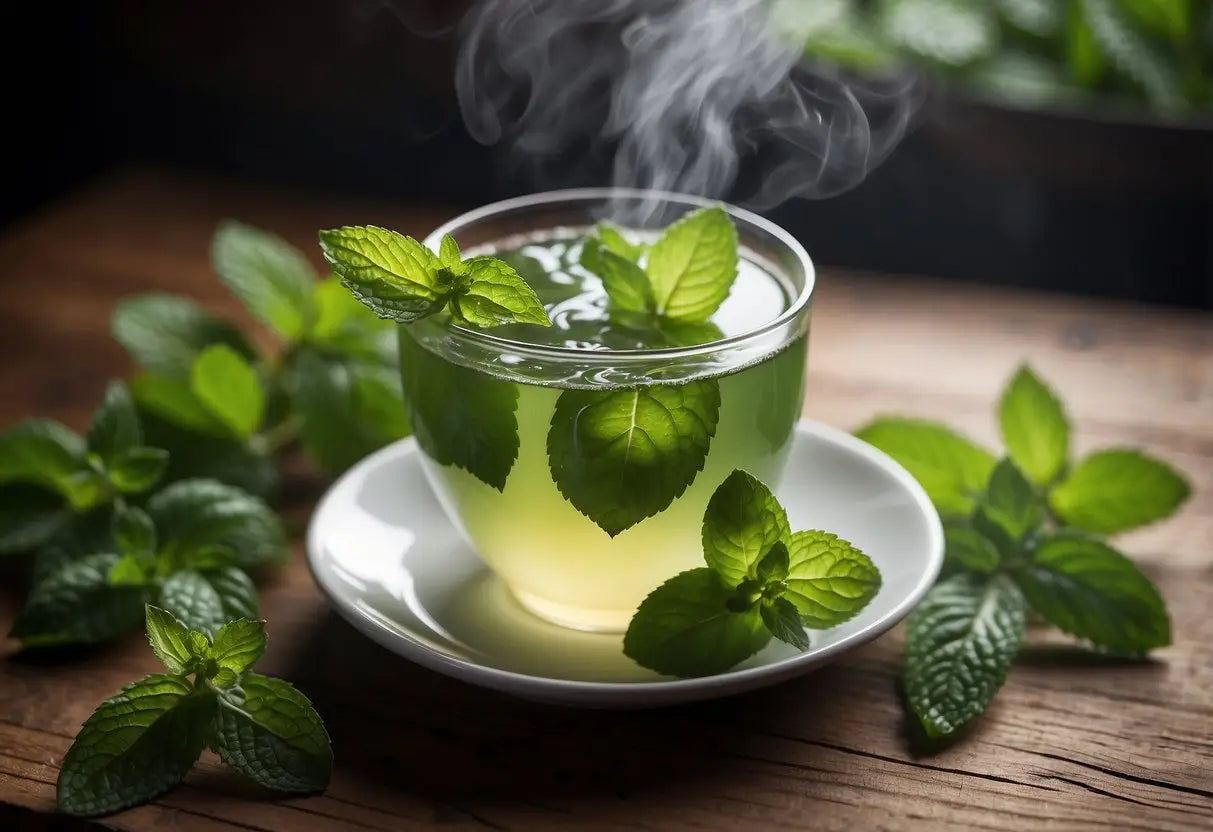What Is Mint Tea Good For
Mint tea offers numerous health benefits, such as aiding digestion, soothing cold symptoms, and reducing stress and fatigue. This section explores these specific benefits that make mint tea a beneficial choice for your well-being.
Digestive Aid and Relief
Mint tea is well-regarded for its ability to ease digestive troubles. The menthol present in mint helps relax the muscles in the digestive tract, reducing cramping and discomfort. Drinking mint tea can also alleviate symptoms of bloating and gas, making it a soothing option for digestive relief.
Additionally, mint tea may improve bile flow, which helps in better digestion of fats. If you frequently experience indigestion or upset stomach, incorporating mint tea into your routine can offer relief. It is especially helpful after meals to promote smoother digestion.
Bestsellers
Soothing Cold Symptoms
When you're suffering from a cold, mint tea can be a comforting remedy. The menthol in mint acts as a natural decongestant. It helps to clear nasal passages, making it easier to breathe. Furthermore, the anti-inflammatory properties help reduce throat irritation and soreness.
The warmth of the tea also provides additional comfort, easing sinus pressure and headaches commonly associated with colds. Drinking mint tea can also aid in reducing cough frequency and can act as an expectorant, helping to expel mucus from the respiratory tract.
Reducing Stress and Fatigue
Mint tea is effective in reducing stress and combating fatigue. The aroma of mint has a calming effect on the mind, which can help lower stress levels. Drinking mint tea may also enhance mental clarity and focus, making it easier to tackle daily tasks without feeling overwhelmed.
The natural soothing properties of mint can also promote better sleep quality. If you feel fatigued or stressed, a cup of mint tea can provide a gentle boost of energy. This makes it an excellent choice for an afternoon pick-me-up or before bedtime to unwind.
Nutritional Profile of Mint Tea

Mint tea offers a range of health benefits due to its rich nutritional content. This section will explore the essential vitamins and minerals found in mint tea, as well as its potent antioxidant properties.
Vitamins and Minerals
Mint tea is a source of several essential vitamins and minerals. Here are some key components:
- Vitamin A: Supports vision, immune function, and cell growth.
- Vitamin B: Contributes to energy production and nervous system health.
- Calcium: Important for bone health and muscle function.
- Magnesium: Supports muscle and nerve function, as well as energy production.
These nutrients, though found in small amounts, can contribute to your daily intake, especially if you consume mint tea regularly.
Antioxidant Properties
Mint tea is notable for its antioxidant properties. Antioxidants are compounds that help neutralize harmful free radicals in your body.
- Flavonoids and phenolic acids: These are primary antioxidants present in mint tea.
- Improved Cellular Health: Antioxidants protect your cells from damage.
Regular consumption of mint tea may reduce oxidative stress and support overall health due to these antioxidants.
Potential Weight Loss Support

Mint tea may offer benefits for weight loss through appetite regulation and as a calorie-free hydration option.
Lao Ban Zhang
Appetite Regulation
Drinking mint tea can help manage your appetite. The menthol in mint has been shown to affect digestion and may reduce hunger. This can be especially helpful when trying to stick to a calorie-restricted diet.
Mint tea can also act as a natural appetite suppressant. Often, the sensation of hunger can be confused with dehydration. By drinking mint tea, you may keep yourself hydrated and less likely to snack unnecessarily. This could lead to fewer calories consumed throughout the day.
Calorie-Free Hydration Option
One major advantage of mint tea for weight loss is that it is a zero-calorie beverage. This makes it an excellent alternative to sugary drinks like soda or juice, which can add a significant amount of calories to your diet. Switching to mint tea can reduce your overall caloric intake.
Additionally, staying hydrated is crucial for efficient metabolism. Drinking mint tea ensures you maintain hydration without consuming extra calories. This can support your body’s natural ability to burn fat and may assist in weight management.
Mint tea also satisfies your taste buds with its refreshing flavor, making it easier to avoid high-calorie drinks. You can enjoy multiple cups throughout the day without worrying about adding extra calories.
Effects on Oral Health

Mint tea can freshen your breath and offer antibacterial benefits that help maintain oral hygiene.
Breath Freshening
Mint tea contains compounds like menthol that can naturally freshen your breath. When you drink mint tea, these compounds release a refreshing aroma that helps mask bad breath.
Because of its natural oils, mint tea can also stimulate saliva production. Increased saliva helps wash away food particles and bacteria, both common causes of bad breath.
Drinking mint tea can be a practical addition to your routine if you are looking to improve breath quality easily and naturally.
Antibacterial Benefits
Mint tea has antibacterial properties that can help reduce harmful bacteria in the mouth. Certain compounds in mint, such as menthol and rosmarinic acid, contribute to its antibacterial effects. These can inhibit the growth of bacteria that lead to plaque formation and tooth decay.
Regular consumption of mint tea may therefore support a cleaner oral environment. By reducing bacterial load, mint tea can play a role in maintaining healthier teeth and gums.
Incorporating mint tea into your diet can thus promote oral hygiene beyond just brushing and flossing.
Side Effects and Considerations
Mint tea is generally safe for most people, but there are some side effects and considerations to keep in mind.
Potential Side Effects
- Heartburn: Some individuals may experience heartburn or acid reflux after drinking mint tea.
- Allergic Reactions: Rarely, you might have an allergic reaction, such as rash, itching, or breathing difficulties.
- Stomach Upset: Mint tea can sometimes cause stomach upset or exacerbate symptoms in those with gastroesophageal reflux disease (GERD).
Interactions with Medications
Mint tea could interact with certain medications. For example:
- Blood Pressure Medication: It may affect the absorption or efficacy of blood pressure medications.
- Antacids: It might interfere with antacids, potentially increasing stomach acid production.
Pregnant and Breastfeeding Women
If you are pregnant or breastfeeding, consult your healthcare provider before drinking mint tea. It might have effects on uterine muscles and milk production.
Overconsumption
Consuming excessive amounts of mint tea can lead to:
- Kidney Issues: Excessive consumption may affect kidney function.
- Nervous System: Overconsumption might cause nervous system issues such as tremors or nervousness.
Special Considerations
- Children: Mint tea is usually safe for children, but it’s best to offer it in moderation.
- Essential Oil: If you use mint in the form of essential oil, be cautious as it is much more concentrated and can have stronger effects.
Always monitor your reactions and consult with a healthcare professional if you experience any adverse effects.
Brewing Techniques for Optimal Benefits

To maximize the health benefits and flavors of mint tea, precise brewing methods are essential.
Infusion Time and Temperature
For the best results, steep mint leaves in hot water between 160°F and 175°F (71°C - 79°C). Use a thermometer to ensure accurate temperature. Avoid boiling water since it can scald the leaves and reduce the tea's beneficial properties.
- Fresh Mint Leaves: Steep for 5-7 minutes.
- Dried Mint Leaves: Steep for 3-5 minutes.
Steeping for too long can cause bitterness and reduce the soothing qualities. Use a timer to maintain accuracy.
Mint Variety Selection
Different mint varieties offer unique benefits. Peppermint is known for its digestive benefits and cooling effect, while Spearmint provides a milder flavor and is gentler on the stomach.
Peppermint:
- Stronger aroma and taste.
- High in menthol, which helps relieve headaches and sinus issues.
Spearmint:
- Sweeter and less intense.
- Contains carvone, beneficial for hormonal balance.
Choose the variety based on your specific needs and preferences. You may also blend different types for a balanced flavor.
Cultural Significance of Mint Tea

Mint tea holds a special place in many cultures. Particularly in North African and Middle Eastern countries, it is deeply embedded in social and cultural practices.
In Morocco, mint tea is a symbol of hospitality. It's commonly served to guests, often prepared with fresh mint leaves, green tea, and sugar.
In Turkey, the tea is enjoyed in social gatherings. It's traditionally served in small, tulip-shaped glasses, offering an aromatic and refreshing experience.
Mint tea is also significant in cultural ceremonies. In some cultures, it is used in traditional rituals and celebrations, highlighting its importance beyond just a beverage.
This tea is often more than just a drink; it reflects traditions, respect, and a sense of community. When you drink mint tea in these regions, you're participating in a ritual that has been passed down through generations.
Incorporating Mint Tea into a Healthy Diet

Mint tea can be a refreshing and beneficial addition to your daily routine. To maximize its benefits, consider the following tips.
Start your day with a cup of mint tea. This can provide a gentle energy boost and aid digestion. Many people find it soothing and refreshing.
Benefits
- Digestive Aid: Helps relieve symptoms of indigestion and bloating.
- Hydration: Counts towards your daily fluid intake.
- Calorie-Free: A fantastic alternative to sugary beverages.
Serving Suggestions
Here are some ways to incorporate mint tea into your diet:
- Hot or Cold: Enjoy it hot in the morning, or iced in the afternoon.
- With Meals: Drink mint tea after meals to aid digestion.
- Blended: Mix with green tea for a different flavor profile.
Frequency
Aim to drink 1-3 cups daily. This amount is sufficient to experience its benefits without overdoing it.
Incorporating mint tea regularly can enhance your diet in subtle, meaningful ways. These tips can help you enjoy the advantages mint tea offers effortlessly.
← Older post Newer post →











